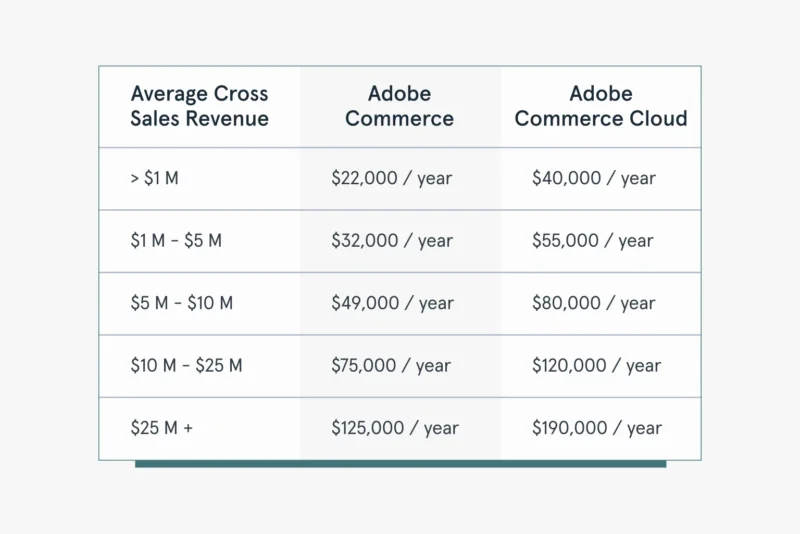Adobe Commerce Review:
Adobe Commerce, powered by Magento, is a leading enterprise-level e-commerce platform known for its robust capabilities and flexibility. This platform is designed to help businesses create rich, engaging shopping experiences that drive conversions. This review will explore the main features of Adobe Commerce, its advantages and disadvantages, the user experience it offers, its pricing model, and the level of community and customer support available.
Table of Contents
Adobe Commerce Features
Adobe Commerce offers an extensive array of features that cater to the needs of large and growing businesses. Key features include customizable web design templates, powerful inventory management tools, and advanced marketing capabilities. The platform supports a variety of payment gateways and currencies, making it well-suited for global commerce. Adobe Commerce excels in its ability to handle complex product catalogs and large-scale e-commerce operations. It also offers personalization through customer segmentation and targeted promotions, dynamic rule-based product relations, and a powerful content management system (CMS). For those looking to extend their capabilities, Adobe Commerce provides integrations with various third-party apps and services through its extensive marketplace.
Adobe Commerce Key Features
- Customizable Platform: Adobe Commerce is highly customizable, allowing businesses to tailor their online stores to meet specific needs. It supports extensive customization through themes and extensions, enabling brands to create unique shopping experiences that align with their identity.
- Scalability: The platform is designed to scale with businesses as they grow, handling large volumes of products and transactions without compromising performance. This makes it suitable for both small businesses and large enterprises.
- Multi-Store and Multi-Language Capabilities: Adobe Commerce supports the management of multiple storefronts and languages from a single platform, making it an excellent choice for businesses operating in multiple countries or regions.
- Omnichannel Selling: Adobe Commerce provides robust omnichannel capabilities, allowing businesses to integrate their online and offline sales channels. This ensures a consistent shopping experience across all customer touchpoints.
- Advanced Marketing Tools: The platform includes advanced marketing tools such as customer segmentation, personalized promotions, rewards programs, and content management capabilities that help businesses engage customers and encourage repeat purchases.
- Comprehensive Inventory Management: Adobe Commerce offers powerful inventory management features that support complex supply chains and fulfillment strategies. It includes options for backorder management, minimum and maximum quantities, and multi-source inventory.
- Integrated B2B Functionality: Adobe Commerce is well-equipped for B2B e-commerce with features like company accounts, custom catalogs, and quote management, making it suitable for businesses that serve other businesses.
- Mobile Optimization: The platform ensures that e-commerce sites are optimized for mobile devices, providing a responsive design that adapts to various screen sizes for optimal shopping experiences on smartphones and tablets.
- Powerful Analytics and Reporting: Adobe Commerce integrates with Adobe Analytics to provide detailed insights into customer behavior, sales trends, and website performance. This data helps businesses make informed decisions to optimize their e-commerce strategies.
- Security and Compliance: Adobe Commerce is committed to high levels of security and complies with global regulations. It provides built-in security features such as CAPTCHA, two-factor authentication, and PCI compliance.

Adobe Commerce Pros & Cons
Pros:
- Scalability: Ideal for large businesses due to its ability to scale and handle complex, large-volume online stores.
- Flexibility: Highly customizable and adaptable to specific business needs thanks to its open-source roots.
- Rich Feature Set: Offers advanced features that cover nearly every aspect of e-commerce management.
Cons:
- Complexity: The platform can be complex to set up and manage, often requiring technical expertise or the help of a developer.
- Cost: Adobe Commerce can be expensive, especially when considering licensing fees, development, and maintenance costs.
- Performance: Due to its robust nature, the platform might require significant server resources, which can affect site speed if not properly optimized.
User Experience
The user experience with Adobe Commerce tends to be highly positive among those who have the resources to fully utilize its capabilities. The admin interface is comprehensive, though it can be overwhelming for beginners. Users appreciate the control they have over their online stores, from design to functionality. However, maximizing the potential of Adobe Commerce typically requires a steep learning curve and possibly ongoing developer support.
Adobe Commerce Pricing
Adobe Commerce does not have a one-size-fits-all pricing model. Instead, it offers custom pricing based on the customer’s specific needs and business size. This typically includes a quote-based annual licensing fee that varies depending on the expected gross sales volume. For smaller businesses or those looking for more predictable costs, Adobe also offers Adobe Commerce on cloud, which might come with different pricing and hosting included.

Community and Customer Support
Adobe Commerce is supported by a robust global community of developers, users, and service providers. The community is an invaluable resource for troubleshooting, customizations, and extensions. Adobe also offers professional customer support through various channels including phone, email, and a comprehensive knowledge base. However, the quality and responsiveness can vary, with some users reporting delays in receiving support.
Integration and Compatibility
Adobe Commerce is renowned for its outstanding integration and compatibility capabilities, making it a highly versatile platform for businesses looking to enhance their e-commerce operations. It supports seamless integration with an array of Adobe products, such as Adobe Experience Cloud, providing tools for analytics, marketing, and customer insights that are vital for creating a personalized shopping experience.
Adobe Commerce offers compatibility with a multitude of third-party applications and systems, including major ERP software, payment gateways, and shipping services, thanks to its robust API and extensive marketplace of extensions. This allows businesses to connect and synchronize their e-commerce platform with various external tools and services, streamlining operations and ensuring a cohesive business management system. Whether it’s enhancing functionality with advanced payment solutions, incorporating custom marketing tools, or linking inventory management systems, Adobe Commerce’s flexible integration framework supports a broad range of business needs, making it an adaptable solution for complex and diverse e-commerce ecosystems.

Adobe Commerce Target Audience
- Large Enterprises: Adobe Commerce is well-suited for large companies that need a powerful e-commerce platform capable of handling high volumes of transactions and complex operations.
- Mid-Sized to Large Retailers: Retail businesses that have outgrown smaller platforms often turn to Adobe Commerce for its scalability and extensive feature set that can handle complex product catalogs and multiple store views.
- B2B Businesses: The platform offers advanced features specifically designed for B2B transactions, such as quote management, price negotiation, and bulk order functionalities, making it ideal for manufacturers, wholesalers, and distributors.
- International Brands: Adobe Commerce supports multi-language and multi-currency functionalities, which are essential for businesses operating in multiple countries or looking to expand internationally.
- Fashion and Apparel: Many fashion retailers use Adobe Commerce because of its ability to create visually appealing sites and its strong inventory management features that can handle numerous product variations.
- Consumer Electronics: Retailers in this sector benefit from Adobe Commerce’s ability to manage complex product categories and integrate with various ERP systems.
- Health and Beauty: This industry benefits from Adobe Commerce’s robust marketing tools to create personalized customer experiences and manage a broad range of products.
- Automotive Industry: Adobe Commerce supports the automotive sector with features that accommodate complex product catalogs with many attributes, which is typical for car parts retailers.
- Food and Beverage: The platform can handle perishable goods sales with features that support subscription models, complex shipping requirements, and local compliance.
- High-Tech and Software Companies: These companies use Adobe Commerce to manage both B2B and B2C operations, utilizing its ability to handle digital products and subscriptions effectively.
Final Verdict
Adobe Commerce stands out as a robust and sophisticated e-commerce platform that caters to a wide spectrum of businesses, from mid-sized retailers to large multinational corporations. Its extensive features, scalability, and deep customization capabilities make it particularly suitable for companies looking to expand their online operations and require a platform that can grow and adapt to their evolving needs.
The strength of Adobe Commerce lies in its ability to integrate seamlessly with a myriad of tools and systems, from Adobe’s own suite of products to a wide array of third-party applications. This integration capability, combined with powerful analytics, advanced marketing tools, and extensive support for B2B functionalities, ensures that businesses can offer a rich, personalized shopping experience to their customers.
While the platform does come with a steeper learning curve and potentially higher cost of ownership, the investment is often justified by the substantial returns in terms of increased efficiency, enhanced customer satisfaction, and higher sales volumes. Furthermore, Adobe Commerce is backed by a strong community and professional customer support, providing businesses with the resources needed to maximize their use of the platform.
For businesses ready to make a significant commitment to their e-commerce strategy, Adobe Commerce offers a compelling solution that combines power, flexibility, and scalability. It is a platform designed not just to meet current e-commerce demands but to anticipate and adapt to future trends and technologies.





